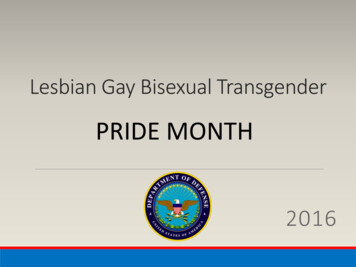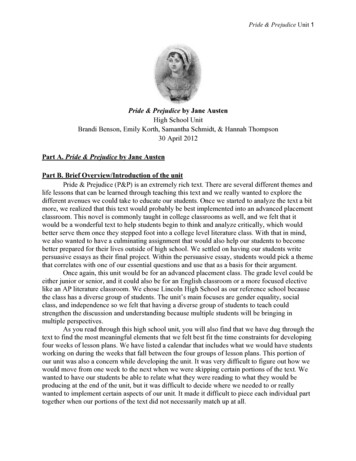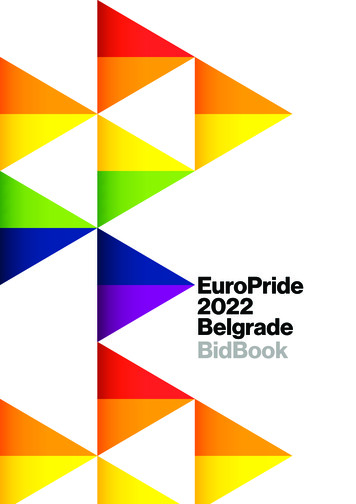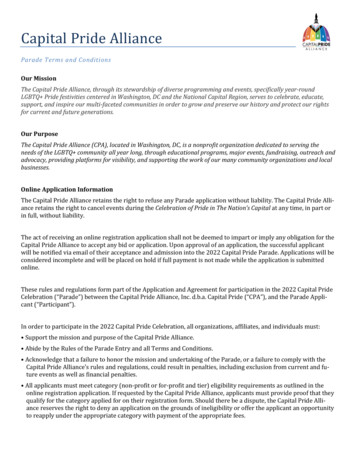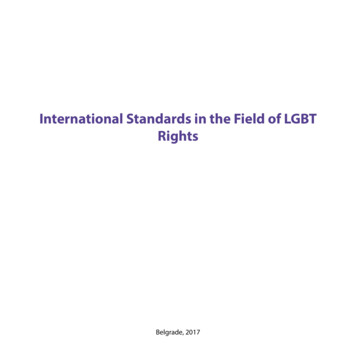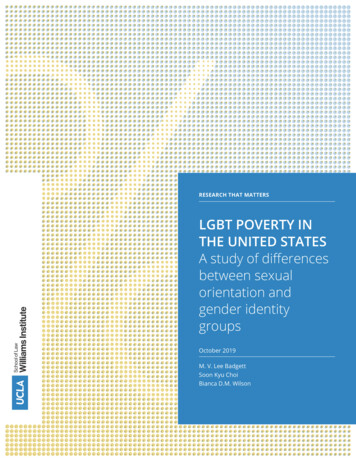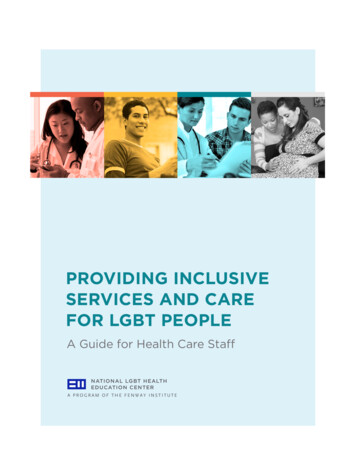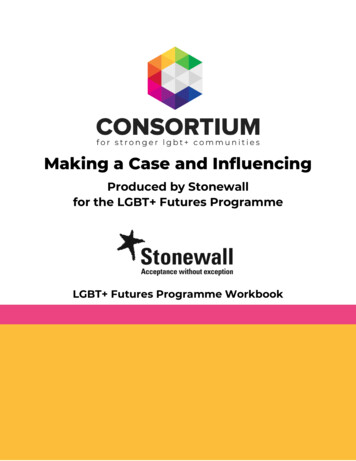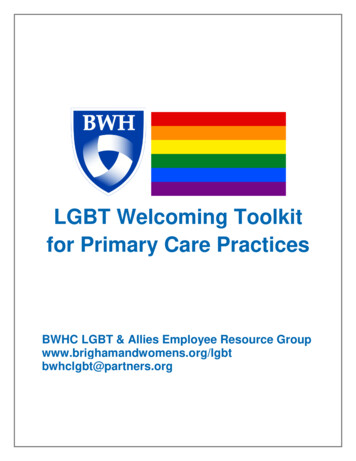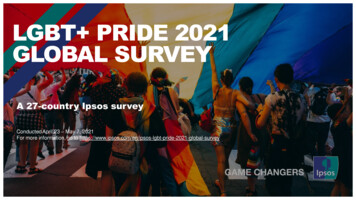
Transcription
LGBT PRIDE 2021GLOBAL SURVEYA 27-country Ipsos surveyConducted April 23 – May 7, 2021For more information, go to bal-survey
LGBT PRIDE 2021 GLOBAL SURVEY – KEY FINDINGSLGBT EXPOSURE ANDENGAGEMENT: WIDEVARIATIONSLGBT EQUALITY:STRONG SUPPORT INMOST COUNTRIESExposure to LGBTpeople and engagementwith the LGBT community varies widelyacross countries: 66% inBrazil report having a gayor lesbian relative, friendor colleague vs. 7% inJapan and South KoreaAnti-discrimination lawsand equal marriage andadoption rights for LGBTpeople are supported bymajorities in most of the27 countries but arefiercely opposed in a fewof themGlobally, there is a lotmore support thanopposition towardcorporate activismpromoting equality2 ‒ Ipsos LGBT Pride 2021 Global SurveyLGBT VISIBILITY: MORESUPPORT THANOPPOSITIONLGBT ATHLETES: AMIXED PICTUREMajorities in most (butnot all) countries supportLGBT people being openabout their sexualorientation or genderidentity with everyoneThere is a great deal ofsupport in most countriesfor lesbian, gay andbisexual athletes insports teams being openabout their orientationOn average, there ismore support thanopposition toward LGBTpeople displayingaffection in public andmore LGBT characterson TV, in films and inadvertisingOn the other hand, whenit comes to allowingtransgender athletes toperform according to thegender they identify with,public opinion is dividedand varies widely acrosscountries
LGBT EXPOSURE &ENGAGEMENT3‒ Ipsos LGBT Pride 2021 Global Survey
LGBT EXPOSURE AND ENGAGEMENT - SUMMARYOn average, globally, 42% say they have arelative, friend or colleague who is lesbian, gayor homosexual, 24% one who is bisexual, 10%one who is transgender, 9% one who is nonbinary, non-conforming or gender-fluid Globally, exposure to a lesbian/gay/homosexualperson is more prevalent among women than amongmen (47% vs 37%) and with Gen Z and Millennials(48% and 45%) than with Gen X and Boomers (39%and 38%); highest in Brazil (66%), Mexico and Chile(64%) and lowest in Japan and South Korea (7%) and,China (11%)30% say they have spoken out against someonewho is prejudiced against LGBT people This includes 40% of Gen Z (vs. 24% of Boomers) and34% of women (vs. 26% of men) Having spoken out against anti-LGBT prejudice isreported by as many of 53% in Argentina and 50% inChile to as few as 7% in Japan13% say they have attended a public event insupport of LGBT people, e.g., a Pride march This includes self-identified gays and lesbians (54%on average globally), bisexuals (37%) andtransgender/non-binary /other gender adults (32%) Gen Z (18%) and Millennials (16%) as opposed toGen X (11%) and Boomers (7%) Adults in Spain (22%), Australia, India, Mexico, andSouth Africa (21%) Exposure to a bisexual person is more prevalent withGen Z (41%) than with Boomers (11%); highest inBrazil (50%), lowest in Japan (4%) Exposure to a transgender person is more prevalentwith Gen Z (14%) than with Boomers (6%); highest inAustralia and Canada (18% both) and lowest inRussia (1%), South Korea and Hungary (2%) Exposure to a non-binary/non-conforming/gender-fluidperson is more prevalent with Gen Z (16%) thanBoomers (5%); highest in Australia and Canada (16%both), the US and South Africa (14% both) and lowestin Russia (2%), Japan, South Korea and Hungary (3%each)4‒ Ipsos LGBT Pride 2021 Global Survey19% say they have visited a bar or night-clubthat caters primarily to LGBT people This includes 70% of self-identified lesbians and gays,41% of self-identified bisexuals, 33% of self-identifiedtransgender/non-binary /other gender adults, and18% of self-identified heterosexuals Experience visiting an LGBT establishment rangesfrom 35% in Great Britain and 34% in Australia to 4%in Japan and Malaysia11% say they have attended a same-sex wedding The incidence of attending a same-sex weddingranges from 21% in Mexico and 20% in Argentina andBelgium to less than 1% in Russia It varies little across gender lines and age groups
EXPOSURE TO SEXUAL ORIENTATIONS AND GENDER IDENTITIESBY COUNTRYQ. Do you have a relative, friend or work colleague who is: % % 11%13%7% %France17%3%4%Germany26%21%17%12%10%2%Great /homosexualNetherlands Ipsos LGBT Pride 2021 Global Survey14%10%7%1%2%PeruPolandBisexualBase: 19,069 online adults aged 16-74 across 27 countries* Online samples in Brazil, Chile, mainland China, Colombia, India, Malaysia, Mexico, Peru, Russia, South Africa, and Turkey tendto be more urban, educated, and/or affluent than the general population5‒14%11%Russia10%6%14%14%6%8%4%2% 3%South Africa South d StatesNon-binary, non-conforming or gender-fluidThe “Global Country Average” reflects the average result for all the countries where the survey was conducted. It has not beenadjusted to the population size of each country and is not intended to suggest a total result.
EXPOSURE TO SEXUAL ORIENTATIONS AND GENDER IDENTITIESBY KEY DEMOS (GLOBAL COUNTRY AVERAGE)Q. Do you have a relative, friend or work colleague who is: % %10%Lesbian/gay/homosexual39%38%26%29%20%16 %11%%8%1411%7%25%11%6%5%BisexualBase: 19,069 online adults aged 16-74 across 27 countries* Online samples in Brazil, Chile, mainland China, Colombia, India, Malaysia, Mexico, Peru, Russia, South Africa, and Turkey tendto be more urban, educated, and/or affluent than the general population6‒ Ipsos LGBT Pride 2021 Global Survey43%41%45%41%38%31%25 21%11%9%10%9%Non-binary, non-conforming or gender-fluidThe “Global Country Average” reflects the average result for all the countries where the survey was conducted. It has not beenadjusted to the population size of each country and is not intended to suggest a total result.12%16%7%7%11%
ENGAGEMENT IN ACTIVITIES INVOLVING OR SUPPORTING LGBTPEOPLE BY COUNTRYQ. Have you a21%18%19%13%13%FranceGermanyGreat BritainMexicoNetherlandsPeruPolandBase: 19,069 online adults aged 16-74 across 27 countries* Online samples in Brazil, Chile, mainland China, Colombia, India, Malaysia, Mexico, Peru, Russia, South Africa, and Turkey tendto be more urban, educated, and/or affluent than the general population Ipsos LGBT Pride 2021 Global 16%20%5%5%3%3%16%14%South Africa South KoreaSpain8%3% 2%1%0%Malaysia7%8%6%21% 19%18%2%12%9%9%6%4% 4%16%4%26%Attended a public event in support of LGBT people (e.g., a Pride march)Visited a bar or a night-club that caters primarily to LGBT enTurkeyUnited StatesAttended the wedding of a same-sex coupleSpoken out against someone who was being prejudiced against LGBT peopleThe “Global Country Average” reflects the average result for all the countries where the survey was conducted. It has not beenadjusted to the population size of each country and is not intended to suggest a total result.
ENGAGEMENT IN ACTIVITIES INVOLVING OR SUPPORTING LGBTPEOPLE BY KEY DEMOS (GLOBAL COUNTRY AVERAGE)Q. Have you ever:70%60%54%40%34%30%26%19 %13%11 %18%12%11 %20 %14%11 %39%24%18%14% 16%13 %12%27%24%20%11%11%15%10%7%Base: 19,069 online adults aged 16-74 across 27 countries* Online samples in Brazil, Chile, mainland China, Colombia, India, Malaysia, Mexico, Peru, Russia, South Africa, and Turkey tendto be more urban, educated, and/or affluent than the general population Ipsos LGBT Pride 2021 Global Survey41%37%32%Attended a public event in support of LGBT people (e.g., a Pride march)Visited a bar or a night-club that caters primarily to LGBT 6%20%11%15% 12%11 %9 %21 %15%13%24%23%15% 16%12%10%9%Attended the wedding of a same-sex coupleSpoken out against someone who was being prejudiced against LGBT peopleThe “Global Country Average” reflects the average result for all the countries where the survey was conducted. It has not beenadjusted to the population size of each country and is not intended to suggest a total result.
SAME-SEXMARRIAGE ANDPARENTING9‒ Ipsos LGBT Pride 2021 Global Survey
SAME-SEX MARRIAGE AND PARENTING - SUMMARYOn average across all 27 countries, 54% supportthe right of LGBT people to marry legally and16% support some other form of legalrecognition Full majorities in 16 countries and pluralities in 7 othercountries support marriage equality Only Russia and Malaysia have majorities against anykind of legal recognition of same-sex relationships Globally, support for marriage equality is higheramong women (60%) than it is among men (48%); it isalso higher with Boomers (56%) than with Millennials(54%) and Gen X (47%), but not as high as it is withGen Z (61%) Support for marriage equality has grown or remainedstable in each one of 15 countries Ipsos surveyed in2013 with the highest increases in Argentina, the US,Hungary, Japan and Italy On average, 36% globally say their views on samesex marriage are different than they were five yearsago with notably higher proportions in China, SouthAfrica, India and all Latin American countries surveyed10 ‒ Ipsos LGBT Pride 2021 Global Survey61% agree that same-sex couples should havethe same rights to adopt children asheterosexual couples do Majorities in 20 countries agree; majorities in Peru,Poland, Malaysia, and Russia disagree As with same-sex marriage, support for equal adoptionrights is higher among women (67%) than it is amongmen (55%) and while it is highest with Gen Z, it ishigher with Boomers (60%) than with Gen X (55%) Support for equal adoption rights is higher or stable ineach one of 15 countries Ipsos surveyed in 2013 withthe highest increases seen in Argentina, Italy andHungaryViews on whether same-sex couples are just aslikely as other parents to successfully raisechildren are nearly identical to those on equaladoption rights 62% on average globally and majorities in all agegroups and in 20 of 27 countries agree same-sexcouples are just as likely as other parents tosuccessfully raise children
NET% allowmarriage orlegal recognitionVIEWS ON SAME-SEX MARRIAGE BY COUNTRYQ. When you think about therights of same-sex couples,which of the following comesclosest to your personal opinion?Base: 19,069 online adults aged 16-74 across 27 countries* Online samples in Brazil, Chile, mainland China,Colombia, India, Malaysia, Mexico, Peru, Russia, SouthAfrica, and Turkey tend to be more urban, educated,and/or affluent than the general populationThe “Global Country Average” reflects the averageresult for all the countries where the survey wasconducted. It has not been adjusted to the populationsize of each country and is not intended to suggest atotal result.11 ‒ Ipsos LGBT Pride 2021 Global SurveyGlobal Country AverageSwedenNetherlandsSpainBelgiumItalyGreat ranceUnited StatesSouth iaSouth 3%17%7%20%68%8%6% 3% Same-sex couples should be allowed to marry legallySame-sex couples should be allowed to obtain some kind of legal recognition, but not to marrySame-sex couples should not be allowed to marry or obtain any kind of legal recognitionNot sure29%16%
VIEWS ON SAME-SEX MARRIAGE BY KEY DEMOS(GLOBAL COUNTRY AVERAGE)Q. When you think about therights of same-sex couples,which of the following comesclosest to your personal opinion?Global Country AverageMale54%16%48%Female13%61%14%47%19%12 ‒ Ipsos LGBT Pride 2021 Global Survey55%53%Education level: High54%Not married14%32%Education level: Medium46%12%17%13%16%15%17%14%72%67%64%75%13%4% %74%18%16%18%60%66%10%45%53%15%12%13%74%Education level: Low69%17%84%Straight15%15%19%56%BisexualThe “Global Country Average” reflects the averageresult for all the countries where the survey wasconducted. It has not been adjusted to the populationsize of each country and is not intended to suggest atotal result.14%18%17%Lesbian/GayMarried13%13%54%Baby BoomersBase: 19,069 online adults aged 16-74 across 27 countries* Online samples in Brazil, Chile, mainland China,Colombia, India, Malaysia, Mexico, Peru, Russia, SouthAfrica, and Turkey tend to be more urban, educated,and/or affluent than the general Other16%19%Gen ZGen XNET% allowmarriage orlegal recognition16%13%14%Same-sex couples should be allowed to marry legallySame-sex couples should be allowed to obtain some kind of legal recognition, but not to marrySame-sex couples should not be allowed to marry or obtain any kind of legal recognitionNot sure64%73%
ACTUAL CHANGE IN SUPPORT FOR SAME-SEXMARRIAGE SINCE 2013 IN 15 COUNTRIES79%81%SwedenQ. When you think about therights of same-sex couples,which of the following comesclosest to your personal opinion?% Same-sex couples should beallowed to marry legally73%Argentina72%67%68% 1368%67% 163% 1548%62%Australia 854%59%France 851%59%United States22 ‒ Ipsos LGBT Pride 2021 Global Survey 555%Italy 1742%46%HungaryPoland 2548%BelgiumSouth Korea 1263%GermanyThe “Global Country Average” reflects the averageresult for all the countries where the survey wasconducted. It has not been adjusted to the populationsize of each country and is not intended to suggest atotal result.075%CanadaJapan-276%76%SpainGreat BritainBase: 19,069 online adults aged 16-74 across 27 countries* Online samples in Brazil, Chile, mainland China,Colombia, India, Malaysia, Mexico, Peru, Russia, SouthAfrica, and Turkey tend to be more urban, educated,and/or affluent than the general populationCHANGE% allow samesex marriage 1630%40% 1624%36% 1026%29% 821%20212013
PERCEIVED CHANGE IN VIEWS ABOUT SAME-SEX MARRIAGE BYCOUNTRYGlobal Country Average36%Q. Still thinking about same-sexmarriage, to what extent do youagree or disagree that:My views on same-sexmarriage are different than theywere five years ago(% Agree)Base: 19,069 online adults aged 16-74 across 27 countries* Online samples in Brazil, Chile, mainland China,Colombia, India, Malaysia, Mexico, Peru, Russia, SouthAfrica, and Turkey tend to be more urban, educated,and/or affluent than the general populationThe “Global Country Average” reflects the averageresult for all the countries where the survey wasconducted. It has not been adjusted to the populationsize of each country and is not intended to suggest atotal result.14 ‒ Ipsos LGBT Pride 2021 Global SurveyChina (mainland)South urkeyItalyJapanAustraliaPolandCanadaSouth KoreaUnited StatesSpainGreat %34%31%31%29%29%28%27%26%25%24%24%24%22%21%16%
PERCEIVED CHANGE IN VIEWS ABOUT SAME-SEX MARRIAGE BY KEYDEMOS (GLOBAL COUNTRY AVERAGE)Q. Still thinking about samesex marriage, to what extentdo you agree or disagree that:My views on same-sexmarriage are different than theywere five years agoGlobal Country Average36%Male36%Female35%Gen Z47%Millennials(% Agree)38%Gen XBaby Non/Binary/OtherStraightEducation: LowEducation: MediumBase: 19,069 online adults aged 16-74 across 27 countries* Online samples in Brazil, Chile, mainland China,Colombia, India, Malaysia, Mexico, Peru, Russia, SouthAfrica, and Turkey tend to be more urban, educated,and/or affluent than the general populationThe “Global Country Average” reflects the averageresult for all the countries where the survey wasconducted. It has not been adjusted to the populationsize of each country and is not intended to suggest atotal result.15 ‒ Ipsos LGBT Pride 2021 Global SurveyEducation: HighMarriedNot married49%36%37%35%36%34%37%
VIEWS ABOUT SAME-SEX COUPLES’ RIGHT TO ADOPT BY COUNTRYQ. Still thinking about same-sexmarriage, to what extent do youagree or disagree that:Same-sex couples should havethe same rights to adopt childrenas heterosexual couples doBase: 19,069 online adults aged 16-74 across 27 countries* Online samples in Brazil, Chile, mainland China,Colombia, India, Malaysia, Mexico, Peru, Russia, SouthAfrica, and Turkey tend to be more urban, educated,and/or affluent than the general populationThe “Global Country Average” reflects the averageresult for all the countries where the survey wasconducted. It has not been adjusted to the populationsize of each country and is not intended to suggest atotal result.16 ‒ Ipsos LGBT Pride 2021 Global SurveyGlobal Country AverageNetherlandsCanadaSwedenSpainArgentinaGreat BritainBelgiumUnited StatesAustraliaGermanySouth AfricaBrazilJapanChileChina th %10%Strongly/somewhat agree44%58%65%67%Not sureStrongly/somewhat disagree
VIEWS ABOUT SAME-SEX COUPLES’ RIGHT TO ADOPTBY KEY DEMOS (GLOBAL COUNTRY AVERAGE)Q. Still thinking about same-sexmarriage, to what extent do youagree or disagree that:Global Country AverageMaleSame-sex couples should havethe same rights to adopt childrenas heterosexual couples61%55%FemaleGen XBaby Boomers8%71%Base: 19,069 online adults aged 16-74 across 27 countries* Online samples in Brazil, Chile, mainland China,Colombia, India, Malaysia, Mexico, Peru, Russia, SouthAfrica, and Turkey tend to be more urban, educated,and/or affluent than the general populationThe “Global Country Average” reflects the averageresult for all the countries where the survey wasconducted. It has not been adjusted to the populationsize of each country and is not intended to suggest atotal result.17 ‒ Ipsos LGBT Pride 2021 Global %8%67%Strongly/somewhat agree29%7%63%Not married32%10%59%38%8%Not sure14%24%7%61%Education: cation: Medium26%7%61%BisexualEducation: Low37%67%Lesbian/GayStraight31%8%Gen ZMillennials8%Stongly/somewhat disagree26%7%
ACTUAL CHANGE IS SUPPORT FOR SAME-SEX COUPLES’RIGHTS TO ADOPT SINCE 2013 IN 15 COUNTRIES81%CanadaQ. Still thinking about same-sexmarriage, to what extent do youagree or disagree that:Same-sex couples should havethe same rights to adopt childrenas heterosexual couples do79%78%Argentina 21Great Britain72%65% 7Belgium72%67% 572% 864%Australia71%67% 4Germany69%71%-268%Japan62% 953%59%Italy 1742%59%Hungary 1742%46%46%South KoreaPoland 959%France18 ‒ Ipsos LGBT Pride 2021 Global Survey 452%United StatesThe “Global Country Average” reflects the averageresult for all the countries where the survey wasconducted. It has not been adjusted to the populationsize of each country and is not intended to suggest atotal result. 177%73%73%Spain% AgreeBase: 19,069 online adults aged 16-74 across 27 countries* Online samples in Brazil, Chile, mainland China,Colombia, India, Malaysia, Mexico, Peru, Russia, SouthAfrica, and Turkey tend to be more urban, educated,and/or affluent than the general population 1170%SwedenCHANGE% agree033%27% 620212013
VIEWS ABOUT SAME-SEX COUPLES’ PARENTING BY COUNTRYQ. Still thinking about same-sexmarriage, to what extent do youagree or disagree that:Same-sex couples are just aslikely as other parents tosuccessfully raise childrenBase: 19,069 online adults aged 16-74 across 27 countries* Online samples in Brazil, Chile, mainland China,Colombia, India, Malaysia, Mexico, Peru, Russia, SouthAfrica, and Turkey tend to be more urban, educated,and/or affluent than the general populationThe “Global Country Average” reflects the averageresult for all the countries where the survey wasconducted. It has not been adjusted to the populationsize of each country and is not intended to suggest atotal result.28 ‒ Ipsos LGBT Pride 2021 Global SurveyGlobal Country AverageNetherlandsCanadaSwedenSpainGreat BritainBelgiumAustraliaArgentinaUnited StatesSouth AfricaGermanyBrazilFranceChileChina PolandSouth rongly/somewhat 9%10%6%62%62%Not sureStrongly/somewhat disagree
VIEWS ABOUT SAME-SEX COUPLES’ PARENTING BY KEY DEMOS(GLOBAL COUNTRY AVERAGE)Q. Still thinking about same-sexmarriage, to what extent do youagree or disagree that:Global Country AverageMaleSame-sex couples are just aslikely as other parents tosuccessfully raise children62%30%56%36%Female68%24%Gen Z69%24%MillennialsGen X62%30%57%Baby er/Non-Binary/Other20 ‒ Ipsos LGBT Pride 2021 Global Survey30%63%Education: MediumThe “Global Country Average” reflects the averageresult for all the countries where the survey wasconducted. It has not been adjusted to the populationsize of each country and is not intended to suggest atotal result.28%63%Education: Low28%61%Education: HighMarried15%64%StraightBase: 19,069 online adults aged 16-74 across 27 countries* Online samples in Brazil, Chile, mainland China,Colombia, India, Malaysia, Mexico, Peru, Russia, SouthAfrica, and Turkey tend to be more urban, educated,and/or affluent than the general population10%31%63%30%56%Not married36%67%Strongly/somewhat agreeNot sure25%Strongly/somewhat disagree
LGBT VISIBILITY ANDEQUALITY21 ‒ Ipsos LGBT Pride 2021 Global Survey
LGBT VISIBILITY AND EQUALITY - SUMMARYOn average globally, 51% support LGBT peoplebeing open about their sexual orientation orgender identity with everyone vs. 16% whooppose it Support is highest in Spain (73%), Argentina (69%) andChile (68%), lowest in Russia (12%) and Malaysia (14%) Support is higher with Gen Z (61%) than with oldergenerations (51% of Millennials, 47% of Gen Y, and 48%of Boomers) and among women than among men (56%vs. 46%)Support for LGBT people displaying affection inpublic is more muted with 37% support and 27%opposition globally Support is expressed by a majority only in Spain (64%),Sweden (56%), Italy, the Netherlands (52% both) andBelgium (50%); full majorities oppose it in Malaysia(65%), Russia (59%) and South Korea (50%) Support is higher among females than males (42% vs.32%) and with Gen Z (50%) and Millennials (40%) thanwith Gen X (32%) and Boomers (29%)Opinions on having more LGBT characters onTV, in films and in advertising align with thoseabout public display of affection with 35%support and 25% opposition on average globally22 ‒ Ipsos LGBT Pride 2021 Global SurveyGlobally, 55% on average support laws banningdiscrimination against LGBT people when itcomes to employment, access to education orhousing and social services vs. 19% whooppose them There is majority support for LGBT anti-discriminationlaws in 21 countries, most so in Sweden (71%), Spainand Chile (70%); support is lowest in Russia (24%),Malaysia (27%), Hungary (31%), Turkey (33%) andSouth Korea (38%), Support varies more across gender lines (59% amongfemales vs. 51% among males) than it does acrossgenerations (from 59% of Gen Z to 53% of Gen X)On average, 47% support companies and brandsactively promoting equality for LGBT people vs.19% who oppose it There is majority support for corporate activism aboutLGBT equality in 14 countries with the highest levels inthe Netherlands (64%), Spain (63%), Italy and Mexico(61%), and majority opposition only in Malaysia (59%)and Russia (54%) Compared to anti-discrimination laws, corporate activismgets as much or more support with Gen Z as well as inIndia, South Africa, Turkey and HungaryViews about openly lesbian, gay and bisexualathletes in sports team mirror those about LGBTpeople in general being out (50% support vs.16% opposition on average) There is a lot more support in for lesbian, gay andbisexual athletes in sports teams being open about theirorientation than opposition (50% vs. 16% on average,globally)But public opinion is divided about allowingtransgender athletes to perform according to thegender they identify with On average, globally, as many support as oppose (32%each) transgender athletes competing based on thegender they identify with, rather than the sex they wereassigned at birth, while 36% are neutral Only India and Spain show (slight) majority support fortransgender athletes’ right to compete according to theirgender; only Russia and Malaysia show majorityopposition Supporters outnumber opponents the most in Argentina,Chile, the Netherlands, Brazil and France; opponentsoutnumber supporters the most in South Korea, Poland,the US, Hungary and Great Britain Globally, support is higher among females than it isamong males (37% vs. 25%) and with Gen Z (42%) thanwith other age groups
VIEWS ABOUT LGBT EQUALITY AND VISIBILITY(GLOBAL COUNTRY AVERAGE)Q. To what extent do yousupport or oppose the following:LGBT people being open about theirsexual orientation or gender identity witheveryoneLGBT people displaying affection inpublic (e.g., kissing or holding hands)51%37%Openly lesbian, gay and bisexual athletesin sports teamsBase: 19,069 online adults aged 16-74 across 27 countries* Online samples in Brazil, Chile, mainland China,Colombia, India, Malaysia, Mexico, Peru, Russia, SouthAfrica, and Turkey tend to be more urban, educated,and/or affluent than the general populationMore LGBT characters on TV, in films andin advertisingNET% support minus% oppose33%36%50%35%27%34%40%16%16%25%The “Global Country Average” reflects the averageresult for all the countries where the survey wasconducted. It has not been adjusted to the populationsize of each country and is not intended to suggest atotal result.32 ‒ Ipsos LGBT Pride 2021 Global SurveyStrongly/tend to supportNeither support nor opposeStrongly/tend to oppose 36 10 34 10
VIEWS ABOUT LGBT VISIBILITY BY COUNTRYQ. To what extent do you support or oppose the following: % %52%Colombia66%58%38%34% FranceGermany73% 73%64%61%59%56% 2%23%15%RussiaSouthSouthSpainAfricaKoreaLGBT people being open about their sexual orientation or gender i dentity with ev eryoneSwedenTurkeyUnitedStatesLGBT people displaying affection in public (e.g., kissing or holding hands)Openly lesbian, gay and bisexual athletes in sports teamsMore LGBT characters on TV, in films and in advertisingBase: 19,069 online adults aged 16-74 across 27 countries* Online samples in Brazil, Chile, mainland China, Colombia, India, Malaysia, Mexico, Peru, Russia, South Africa, and Turkey tendto be more urban, educated, and/or affluent than the general population24 ‒ Ipsos LGBT Pride 2021 Global Survey39%32%12% 11%5%5%Mexico40%46% 47%39%34%31%61%45%39%14% 15%10% 2%44% 36%35%GlobalCountryAverage63%55%The “Global Country Average” reflects the average result for all the countries where the survey was conducted. It has not beenadjusted to the population size of each country and is not intended to suggest a total result.
VIEWS ABOUT LGBT VISIBILITY BY KEY DEMOS(GLOBAL COUNTRY AVERAGE)Q. To what extent do you support or oppose the following: % support81% 86%76%75 %74% 73%61%56%51% 50%46%45%37 %35%55%42 % 41%65 %6%60%257%60%51% 51%50 %4%740%32 %29%47%46% 48% 46%38%56%51%50%48%46%36%32 %31% 29%33%49% 49%52% 50% 52%36% 35% 36%56%51%45%43%39 %34%36%LGBT people being open about their sexual orientation or gender identity with everyoneLGBT people displaying affection in public (e.g., kissing or holding hands)Openly lesbian, gay and bisexual athletes in sports teamsMore LGBT characters on TV, in films and in advertisingBase: 19,069 online adults aged 16-74 across 27 countries* Online samples in Brazil, Chile, mainland China, Colombia, India, Malaysia, Mexico, Peru, Russia, South Africa, and Turkey tendto be more urban, educated, and/or affluent than the general population25 ‒ Ipsos LGBT Pride 2021 Global Survey30 %26%The “Global Country Average” reflects the average result for all the countries where the survey was conducted. It has not beenadjusted to the population size of each country and is not intended to suggest a total result.28%43%40%
VIEWS ABOUT LGBT EQUALITY AND VISIBILITY(GLOBAL COUNTRY AVERAGE)Q. To what extent do yousupport or oppose the following:Laws banning discrimination againstLGBT people when it comes toemployment, access to education,housing and social services, etc.55%Companies and brands activelypromoting equ
Having spoken out against anti-LGBT prejudice is reportedby as many of 53% in Argentina and 50% in Chile to as few as 7% in Japan This includes self-identified gays and lesbians (54% . (e.g., a Pride march) Visited a bar or a night-club that caters primarily to LGBT people Russia South Africa South Korea Spain Sweden Turkey United States

